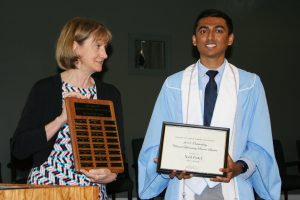Congratulations to Neil Patel, class of 2018, whom the Divison of Clinical Laboratory Science recognized as its outstanding senior at its graduation ceremony. Read more about Neil’s experience in our program and what he plans for the future.

Where are you from?
I have called the Charlotte area home for almost my whole life.
Why did you choose to study clinical laboratory science?
Science, in general, has been one of my favorite subjects since childhood, and high school biology and chemistry classes were always the periods I looked forward to the most in my schedule. However, after a freshman year of 200 to 300 person science lectures while at UNC-CH, I began to feel very distant to the material I was learning. Unlike the giant lectures classes, the small lab courses really pushed my passion for science through the direct application of everything I had learned from the lectures. I found the laboratory to be a place for me to conduct the tests myself, obtain results almost instantaneously, and help make a lasting difference in some way. Taking all of this into account and some information gathering from CLS professors and lab tours, I applied to the Clinical Laboratory Science program as a sophomore, and I am very proud of my decision I made because I had the chance to learn from some of the best professors in the University alongside some of the smartest CLS students the program has ever had.
How/did clinical rotations help you get a better understanding for the field?
My clinical rotations through Duke, UNC-CH, and the VA hospitals opened my eyes to a wide array of techniques, tests, and instruments that I learned about while in the workforce. Through rotating in the different laboratories in each of these institutions, I had a unique opportunity to familiarize myself with the different medical analyzers and examine each facility’s methods to obtaining accurate results. In addition to learning from the techs about the operations of the lab, I was also given ‘unknown’ samples to run tests on, which helped give insight into the different patient populations each hospital primarily dealt with.
What are your plans for after graduation?
In the next couple months, I hope to become certified as a Medical Laboratory Scientist. However, in the meantime, I have just recently accepted a position as a Tissue Typing Specialist in Immunology for Atrium Health, formerly known as the Carolinas HealthCare System. While working in this position, I will be responsible for HLA typing patients and living or deceased donors for potential heart, kidney, lung, or bone marrow transplants. Once donor typing results are obtained and sent to the appropriate coordinators and doctors, it will be determined if I need to conduct crossmatches on current Atrium Health patients in order to discover the best possible match. Alongside training in HLA, I will also be trained in Flow Cytometry and eventually have the ability to analyze and provide CD marker results of lymphoma, leukemia, or HIV patients to pathologists.
How did faculty and your graduating class encourage you during your time as a student?
Through spending every day of the week with such a small class, it really did seem that we were one big family. If I ever needed help with a concept or had a question during class, I always knew that I could get assistance from my classmates and receive the answer to the question from my professor. It was also very helpful to have a small group of professors who understood the challenges of the program and scheduled around the major tests and assignments of other CLS professors. Looking back at it now, I really do believe that the closeness my classmates and I had with each other helped us get though all those midterms and finals.
How did you feel when you won the outstanding student award for 2018?
When I first learned that I was receiving this award, I was completely surprised. My shock was due to the fact that I knew the other students in my class were each outstanding individuals that dedicated significant amounts of time towards succeeding in the program. Each classmate is extremely smart, hard working, and passionate about clinical laboratory science, and I definitely would not have been able to get through the CLS program without them.
What would you say to someone considering entry into the field?
If you have a passion for hands on work with regards to science, want to help people in a more immediate sense rather than later, and are good at solving problems, then Clinical Laboratory Science is a field that you should consider entering. However, it is no cakewalk. You will be tested constantly and you will need to manage your time wisely with studying, but with the right professors and classmates around you, you will learn a great amount of information and succeed. Another fact that should be noted is that there is a country-wide shortage of medical laboratory scientists, so successful completion of the CLS program and ASCP certification will likely lead you to obtaining multiple job offers before obtaining your degree.